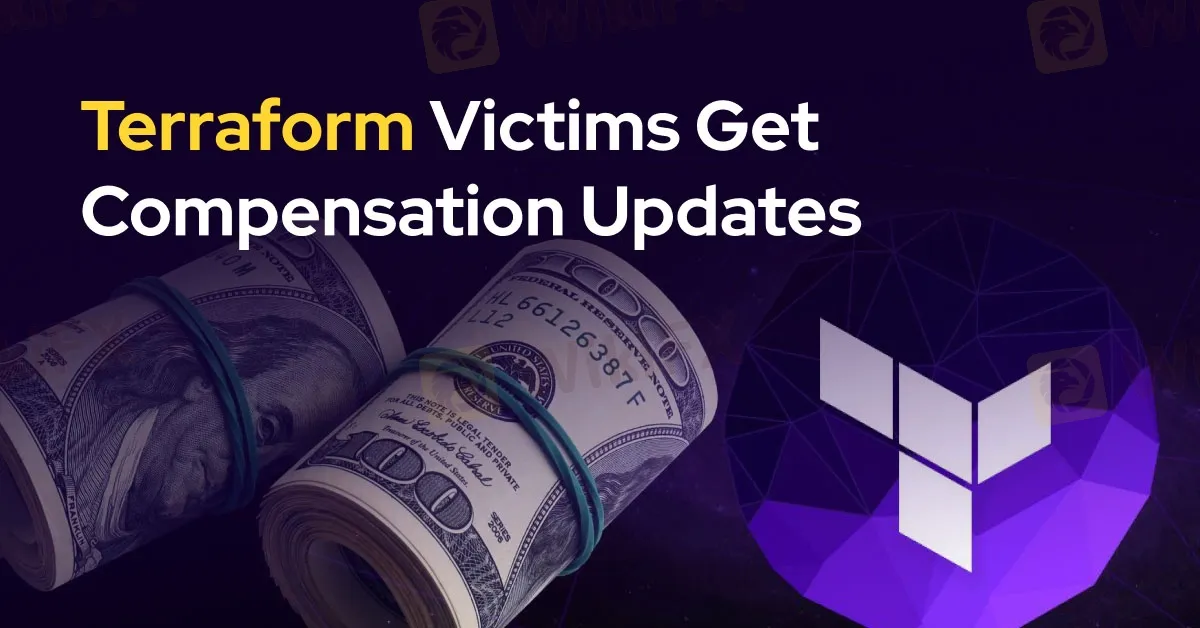简体中文
繁體中文
English
Pусский
日本語
ภาษาไทย
Tiếng Việt
Bahasa Indonesia
Español
हिन्दी
Filippiiniläinen
Français
Deutsch
Português
Türkçe
한국어
العربية
Terraform Victims Get Compensation Updates
Abstract:The U.S. Securities and Exchange Commission (SEC) has launched a dedicated information page for investors affected by the collapse of Terraform Labs, the company behind the failed stablecoin Terra USD (UST).

The U.S. Securities and Exchange Commission (SEC) has launched a dedicated information page for investors affected by the collapse of Terraform Labs, the company behind the failed stablecoin Terra USD (UST).
Following a significant settlement last month, Terraform Labs is required to pay $4.47 billion, including $3.58 billion in disgorgement and a $420 million civil penalty. Initially, the SEC had aimed to impose a $5.3 billion fine, which would have been the largest ever against a cryptocurrency firm.
As part of the settlement, co-founder Do Kwon is banned from serving as an officer or director of any public company. Kwon is also personally liable for $110 million in disgorgement and approximately $14.3 million in prejudgment interest.
This settlement follows a jury verdict that held Terraform Labs and Kwon responsible for the collapse of the Terra ecosystem, resulting in a $40 billion loss for investors. The SEC has clarified that it will not receive any payments until investors and creditors are fully compensated through the related bankruptcy proceedings. A Chapter 11 plan confirmation hearing is scheduled for the fall.

The case dates back to February 2023, when the SEC charged Terraform Labs and Do Kwon with civil fraud and misleading investors about Terra USD. The stablecoin, linked algorithmically to the governance token Luna, was intended to maintain a stable value through market mechanisms. In April, a jury found Terraform Labs and Kwon guilty of civil fraud.
The U.S. Commodity Futures Trading Commission (CFTC) has also issued an advisory warning about “follow-on frauds,” which target previous scam victims with fraudulent recovery schemes. Melanie Devoe, Director of the CFTCs Office of Customer Education and Outreach, highlighted the severe financial and emotional impact of such frauds. The CFTC advised against sending cryptocurrency to unknown online entities and recommended verifying the registration of crypto platforms with the Financial Crimes Enforcement Network before trading.
The SEC has expressed concerns over Terraforms decision to hire the law firm Dentons, suggesting it may be an attempt to protect funds from potential judgments related to the TerraUSD case.
The case has drawn international attention, with enforcement authorities and financial regulators, including Interpol, seeking Do Kwon for his alleged role in the TerraUSD collapse.
As the legal and financial repercussions continue, the SECs new information page provides a vital resource for investors navigating the aftermath of one of the most significant failures in the cryptocurrency sector.

Disclaimer:
The views in this article only represent the author's personal views, and do not constitute investment advice on this platform. This platform does not guarantee the accuracy, completeness and timeliness of the information in the article, and will not be liable for any loss caused by the use of or reliance on the information in the article.
Read more

BaFin Issues Warnings Against Unauthorised Crypto and Investment Platforms
BaFin has recently flagged multiple websites, including stcwelt.com and mega-platz.pro, for offering financial and cryptoasset services without proper authorisation. Stay informed and protect your investments.

Hola Prime Unveils 1-Hour Withdrawal Futures Trading and MT4 Forex Upgrade
Hola Prime launches the world’s first 1-hour withdrawal futures prop trading and expands forex with MT4 integration, setting new standards in trader-focused innovation.

US Federal Reserve May Cut Interest Rates in September, Says Goldman Sachs
US Federal Reserve Chair Jerome Powell may slash the policy rate in September 2025, according to research economists at Goldman Sachs. Read this to learn more.

Monzo Fined £21M: FCA Slams Bank Over High-Risk Accounts Breach
The FCA fines Monzo £21M for anti-money laundering failures, citing high-risk account breaches and systemic control failures. Discover Monzo’s response and improvements.
WikiFX Broker
Latest News
MT4 vs MT5: A comprehensive comparison in terms of functionality
Top Forex Trading Strategies for the London Session
Swissquote Takes Full Control of Yuh Digital Finance App in Major Deal
Top 5 Forex Pairs Every Trader Should Have on Their Radar
What WikiFX Found When It Looked Into Decode Global
Treasury yields rise as Trump's new tariff rates in focus
Know the Major Risks of UbitMarkets, Before You Invest!
Trump's tariffs overshadow the pomp and pageantry as Macron meets King Charles
Boeing delivers most airplanes since late 2023 after ramping up 737 Max output
Inflation expectations drift back down to pre-tariff levels, New York Fed survey shows
Currency Calculator


